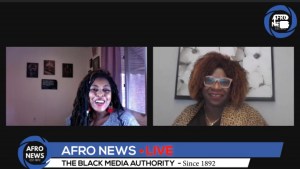By Micha Green
AFRO D.C. and Digital Editor
mgreen@afro.com
The decades-long HIV/AIDS epidemic and the two-year long COVID-19 pandemic, which have both heavily impacted Black communities, has offered a high definition microscope for the rest of the world and America into the healthcare inequities African Americans face daily. As the country celebrates and acknowledges National Black HIV/AIDS Awareness Day on Feb. 7 and the days following, the Black AIDS Institute (BAI) is working to continue it’s more than two decades of working to educate people on HIV/ AIDS and preventive care, removing stigma on the disease and improving access to quality healthcare for Black Americans, not only in the wake of COVID, but forever.
“The Black AIDS Institute, is radically partnering, across the country, with other AIDS service organizations, as well as traditional women’s organizations, as well as other traditional social organizations to inform our community that, one, HIV is no longer a death sentence. We need everyone’s participation to remove stigma. Because COVID is actually HIV for the planet. When people have COVID, we’re taking care and checking on them; and if someone has HIV you wouldn’t even let them use their bathroom. Whereas, it’s actually more dangerous to let someone use your bathroom with COVID than HIV. So we all have to get on the same page. Two, we will be participating in the Honorable Barbara Lee’s convening, on Feb. 8, which is with the Congressional Black Caucus. The Congressional Black Caucus will have a national HIV/ AIDS Awareness Day where they will also bring forward scientific information, current advancements and other opportunities, but you can always find us at BlackAIDS.org,” said BAI Board Chair Grazell Howard on AFRO Live on Feb. 3.

While the seventh marks the official National Black HIV/AIDS Awareness Day, Howard said that BAI and organizations across the country are working the entire week- and truly 24/7- to continue informing people about HIV/AIDS, while also working to combat healthcare disparities for Black people in general.
Howard said part of educating, informing and engaging people in the conversation about HIV/ AIDS in the Black community is by changing the narrative.
“I know the plight, challenges, the glories and the contributions of being Black, however some of the messaging is a little off. Oh well, ‘we were the sickest, because we had the worst jobs.’ We were the sickest, perhaps, because we had some of the worst outcomes, because we also had different symptoms in the COVID SARS experience. That’s a different message isn’t it? We are working hard at BAI, in removing stigma. So we focus on stigma of HIV, but we also have to focus on stigma of being Black. So we always are ready to take that we are at the bottom of the heap as a vitamin, perhaps that’s not really the case,” Howard said, reframing the scenario. “Perhaps the case it’s that we’re merely neglected in the healthcare system.”
“When we don’t present with the fever and we’re sent back home, it’s probably because we’re taking anti-inflammatories, diabetes medicine, hypertension medicine. So in this whole public health crisis, we have an opportunity, the opportunity to understand the nuances, understand there’s still challenges to access and knowledge, but we really could remove stigma. Stigma from HIV and stigma from the fact that we are so unhealthy just because. And the healthcare system, and the public health messaging can understand it is an entitlement that we be treated and assessed based on our makeup,” the passionate BAI Board Chair added.
Howard also noted the importance of unpacking the access to healthcare conversation. She said it’s not just about access to healthcare, but quality healthcare with a cultural context.
“Access is critical. Access is an entitlement. However, access in a vacuum is not the conversation. The conversation that we are purporting and supporting is access to quality healthcare, in a cultural context. The cultural context is as important as the access to healthcare, because if that access cannot inform and treat you in a way that is sustainable, to allow you to thrive and live a whole healthy life, we’re still not where we need to be,” she said.
The BAI Board Chair also emphasized the importance of medical researchers to prioritize Black communities in order to know how to properly treat and care for African Americans to eradicate such diseases like COVID and HIV/AIDS disproportionately affecting people of color.
“We need research to come to our communities. And that’s what COVID is showing us. We need research to come to our communities so we can actively participate in tools, skills, and biomedical advancements that fall into the cultural context of how we live. For example, we know cultures that have been wearing masks forever. That wasn’t in our culture,” she said.
Raising awareness and combatting HIV/AIDS in the Black community is not just the job of health organizations and clinicians, but for all people.
“When you go to BlackAIDS.org, you will also see that we need everyone’s help in moving forward. And what does everyone’s help mean? If you go to our website and you see that legislation, take it to your pastor, take it to your sorority meeting, take it to missionary society meeting, take it to the book club, take it to the barbershop, take it to the hair salon and just have everyone say, ‘these laws matter for all of us,’” Howard explained.
The Black AIDS Institute has several resources and curriculums regarding HIV/AIDS awareness, prevention, treatment and care, as well as tools for women’s health care, COVID-19 information, ending stigma and how to join the fight and movement to end the triple pandemics affecting Black Americans of HIV/AIDS, coronavirus and racial inequality. These resources can be found on BlackAIDS.org.
“Remember to be disease free is an entitlement, to love is an entitlement. And you can live how you want, and love how you want, with who you want, when you want, as long as you want, {safely}. And as long as you’re interested in knowing that, please go to BlackAIDS.org.”
Help us Continue to tell OUR Story and join the AFRO family as a member – subscribers are now members! Join here!
The post National Black HIV/AIDS Awareness Day: Black AIDS Institute committed to educating, removing stigma, improving healthcare access appeared first on AFRO American Newspapers .











